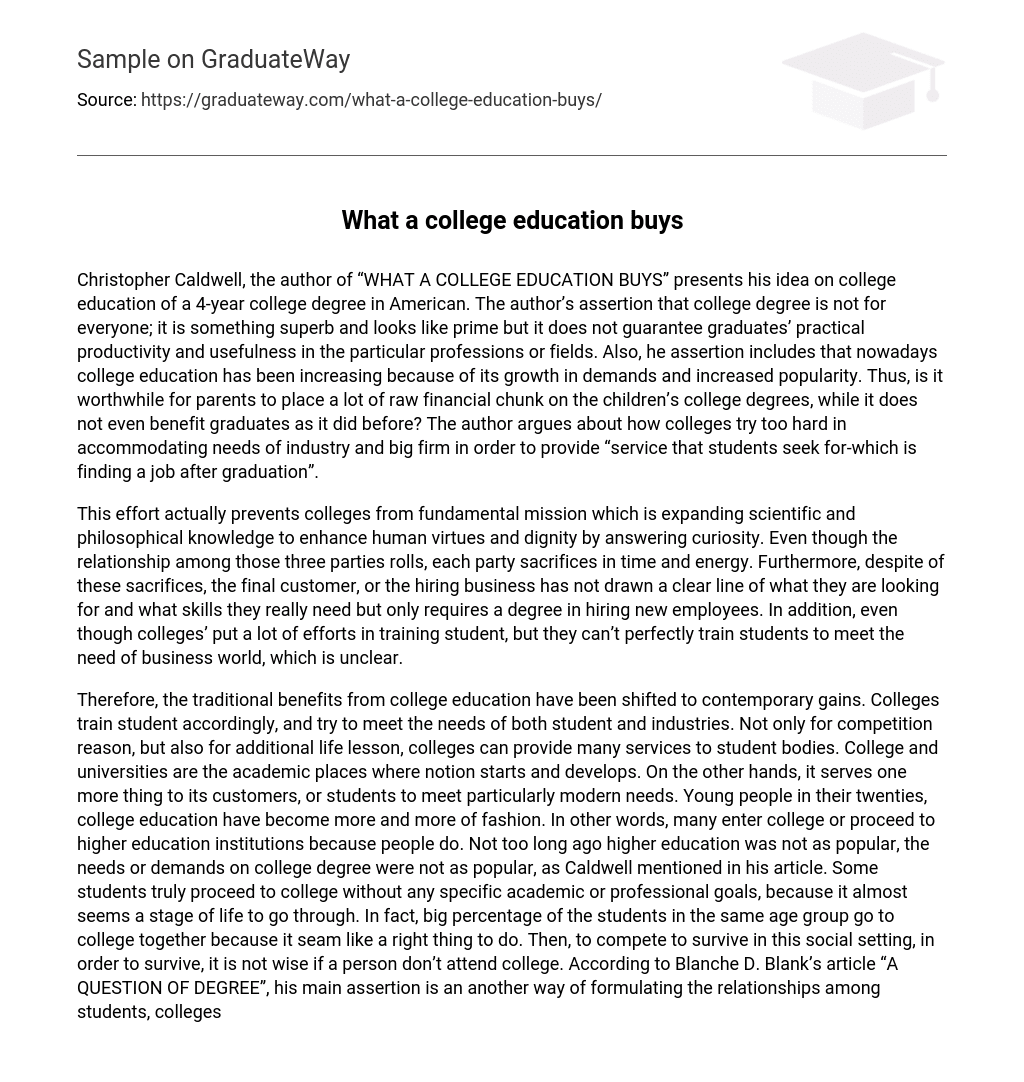Christopher Caldwell, the author of “WHAT A COLLEGE EDUCATION BUYS” presents his idea on college education of a 4-year college degree in American. The author’s assertion that college degree is not for everyone; it is something superb and looks like prime but it does not guarantee graduates’ practical productivity and usefulness in the particular professions or fields. Also, he assertion includes that nowadays college education has been increasing because of its growth in demands and increased popularity. Thus, is it worthwhile for parents to place a lot of raw financial chunk on the children’s college degrees, while it does not even benefit graduates as it did before? The author argues about how colleges try too hard in accommodating needs of industry and big firm in order to provide “service that students seek for-which is finding a job after graduation”.
This effort actually prevents colleges from fundamental mission which is expanding scientific and philosophical knowledge to enhance human virtues and dignity by answering curiosity. Even though the relationship among those three parties rolls, each party sacrifices in time and energy. Furthermore, despite of these sacrifices, the final customer, or the hiring business has not drawn a clear line of what they are looking for and what skills they really need but only requires a degree in hiring new employees. In addition, even though colleges’ put a lot of efforts in training student, but they can’t perfectly train students to meet the need of business world, which is unclear.
Therefore, the traditional benefits from college education have been shifted to contemporary gains. Colleges train student accordingly, and try to meet the needs of both student and industries. Not only for competition reason, but also for additional life lesson, colleges can provide many services to student bodies. College and universities are the academic places where notion starts and develops. On the other hands, it serves one more thing to its customers, or students to meet particularly modern needs. Young people in their twenties, college education have become more and more of fashion. In other words, many enter college or proceed to higher education institutions because people do. Not too long ago higher education was not as popular, the needs or demands on college degree were not as popular, as Caldwell mentioned in his article. Some students truly proceed to college without any specific academic or professional goals, because it almost seems a stage of life to go through. In fact, big percentage of the students in the same age group go to college together because it seam like a right thing to do. Then, to compete to survive in this social setting, in order to survive, it is not wise if a person don’t attend college. According to Blanche D. Blank’s article “A QUESTION OF DEGREE”, his main assertion is an another way of formulating the relationships among students, colleges, and business/society should be implemented in a direction that more energy and materials are spent in upgrading human and social dignity instead of focusing on responding to the job markets and business needs. Then, does an expensive English degree compensate the cost invested for it? In addition, only 15-45% of Americans have the proper knowledge to compete in the collage level course. Now days there are so many graduates with college degree, but that does not guarantee higher salaries. Even though agreeing the problems and malfunctions of colleges discussed by both authors, Caldwell and Blank, it is inevitable to follow social trend to survive the competition.
Allyn’s story on his college life points out what he wishes that he received when he was in college. This poring aligns with Blank’s discussion that young adults might miss important time or chance to learn about human dignity during meeting the compulsory studies. In modern society, many of schools offer many different diversity trainings and study session to teach student about respect and harmony among diverse student populations. Therefore, students actually have chances to develop their thoughts on people who are different from themselves and to learn how to respect. Therefore, colleges also serve as a buffering place that provides additional life lessons to its student bodies. Caldwell ‘s expectation on college education that it will provide and allow more and better quality chances in future for graduates should not be neglected. It is still the main reason why students try to enter college. However, not the young people will ask to general society- is it only that why you go to college? My answer is “Yes”, because colleges and universities are the academic places where notion starts and develops. And it offers one more thing to its students to meet particularly modern needs. Now young people in their early to late 20s, college educations have become more and more natural course and trend. In other words, many enter college or proceed to higher education institutions because their peer is doing it.
Also in order to compete and survive in this modern world isn’t it wise to go to college? Caldwell’s viewpoint should be respected however colleges is provide students student with knowledge to compete in today society compare to the olden days. In addition, many of schools provide many different diversity trainings and study session to teach student about respect and harmony among diverse student populations. Therefore, students actually have chances to develop their thoughts on people who are different from themselves and to learn how to respect other that come from a different culture compare to their own. Colleges also serve as a buffering place that provides additional life lessons to its student bodies. The traditional gains from college education have been motivated to contemporary gains. Also, colleges also act accordingly to meet the needs of both students and industries. Not only for competition reason, but also for additional life lesson, colleges can provide many services to student bodies.





